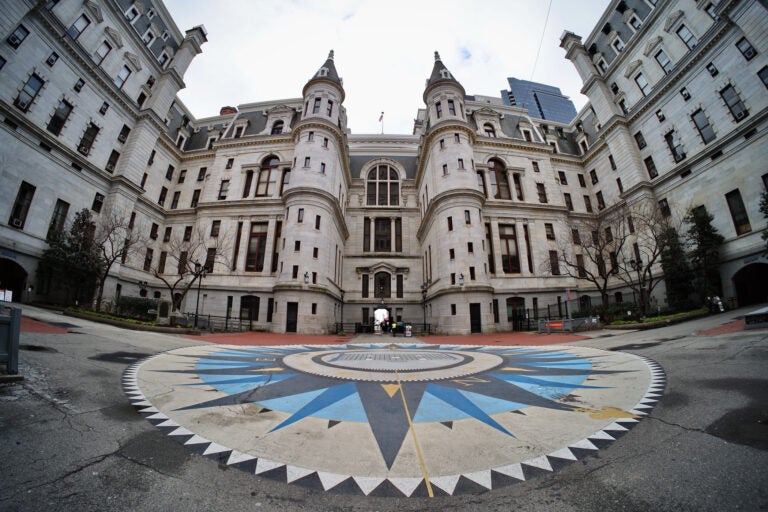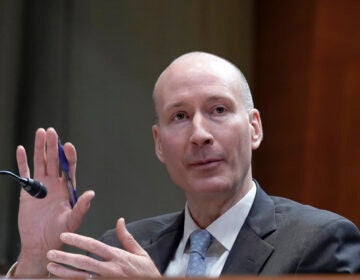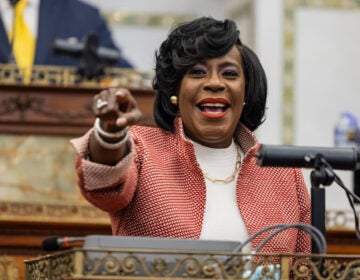3 takeaways from City Council’s hearing on Philly’s efforts to slash climate pollution
“It's anybody's guess as to whether we're on track for 2050,” one witness said.

Philadelphia City Hall Courtyard. (Emma Lee/WHYY)
This story is part of the WHYY News Climate Desk, bringing you news and solutions for our changing region.
From the Poconos to the Jersey Shore to the mouth of the Delaware Bay, what do you want to know about climate change? What would you like us to cover? Get in touch.
The city of Philadelphia has promised to zero out its climate pollution by 2050 — and some members of City Council want to get there sooner.
Meanwhile, the world is on track to blow past a key warming threshold, and most countries have fallen behind on their pledges to slash their planet-warming emissions. It’s not clear that Philly is doing any better, experts and advocates told a handful of members of City Council during a Legislative Oversight Committee hearing Monday.
“2050 is not far off for the immense scaling up that we will need in order to stave off the worst effects of climate change in Philadelphia,” said Emily Schapira, CEO of the quasi-governmental Philadelphia Energy Authority. “It’s anybody’s guess as to whether we’re on track for 2050.”
Here are three takeaways from the hearing.
Emissions reductions so far have been ‘low-hanging fruit’
Officials with the city’s Office of Sustainability told committee members about the actions the city has taken so far to reduce its own emissions and emissions coming from the private sector.
The city has invested in a solar farm expected to power up to a quarter of city-owned buildings, started replacing some of its old gas-powered fleet vehicles with electric versions, begun replacing street lights with more energy-efficient LEDs, and launched energy efficiency projects in buildings such as City Hall to cut their energy use. The city has a plan to boost the city’s tree canopy, invests in street improvements to make them more walkable and bikeable, and requires large, commercial buildings to “tune up” the efficiency of their building systems, officials testified.
But these efforts to reduce emissions amount to “low-hanging fruit,” said Schapira, with the Philadelphia Energy Authority. She said the investments to date have largely been for changes that will pay for themselves in energy savings.
“It’s things that can be budget-neutral,” she said. “We haven’t reorganized how we do things. We haven’t asked for a lot of change, and we certainly haven’t asked for sacrifice.”
Advocates want Philly to fund home repairs and ditch natural gas
Experts and advocates who testified during Monday’s hearing called on City Council to use its legislative power to bring about bolder action. \
“We need y’all, man,” said Shawmar Pitts, co-director of the Grays Ferry-based environmental justice advocacy group Philly Thrive. “We need legislation. … That’s how we’re going to change it.”
Pitts and others asked the council members to pass local funding for a home repair, weatherization, and solar energy program run by the Philadelphia Energy Authority, called Built to Last.
“People are losing their homes because they can’t afford to make essential repairs,” Pitts said. “Repairing homes in a way that increases energy efficiency and adds clean energy is a no-brainer way to transition from fossil fuels.”
Buildings and industry contribute most of the city’s carbon emissions. Most homes in Philly are heated by natural gas, supplied by the city-owned Philadelphia Gas Works.
Experts and advocates testified that City Council should bar new big construction projects from relying on fossil fuels for heating, should require Philadelphia Housing Authority projects to meet climate standards, force developers to report the emissions associated with their building materials, and demand more transparency from PGW about its plan to transition away from selling natural gas.
“Ask for all projects: will this contribute to the urgent transformation of Philadelphia that is needed, or will it perpetuate the status quo?” said Rob Kuper, professor of Architecture & Environmental Design at Temple University.
At-large Councilmembers Isaiah Thomas and Rue Landau, who lead the Legislative Oversight Committee, promised to hold future hearings on the city’s progress toward carbon neutrality, including representatives from entities such as PGW, PECO, the school district, and PIDC. Other than the city, the only major land owner or utility represented during Monday’s hearing was Vicinity Energy, which owns a steam loop in Philadelphia that is currently one of Philly’s biggest climate polluters, but has committed to decarbonize its operations by 2030.
“We want to make sure that we’re doing our part as the legislative body to hold the proper partners and organizations accountable,” Thomas said.
Can we get to carbon neutral by 2040? City officials did not commit
Councilmembers Thomas and Landau have each said they want to get the city to net-zero carbon emissions before 2050.
“I want to make sure it happens before then,” Landau said Monday.
It’s a sentiment shared by climate activists, who see the impacts of warming — like hotter summers, bigger wildfires, and heavier rain and flooding — already affecting Philly.
“We don’t have until 2050,” said Pitts, with Philly Thrive. “We gotta act right now.”
Councilmember Thomas asked Liz Lankenau, interim director of the city’s Office of Sustainability, whether the city could feasibly zero out its emissions by 2040. Lankenau said it’s “hard to say” how the city could get there by 2040, but mentioned unprecedented levels of federal funding available for climate-related action and her office’s focus on home weatherization to reduce energy use “regardless of what kind of energy is powering buildings.”
“There are certainly levers and actions we can pull to expedite,” Lankenau said.

Get daily updates from WHYY News!
WHYY is your source for fact-based, in-depth journalism and information. As a nonprofit organization, we rely on financial support from readers like you. Please give today.









